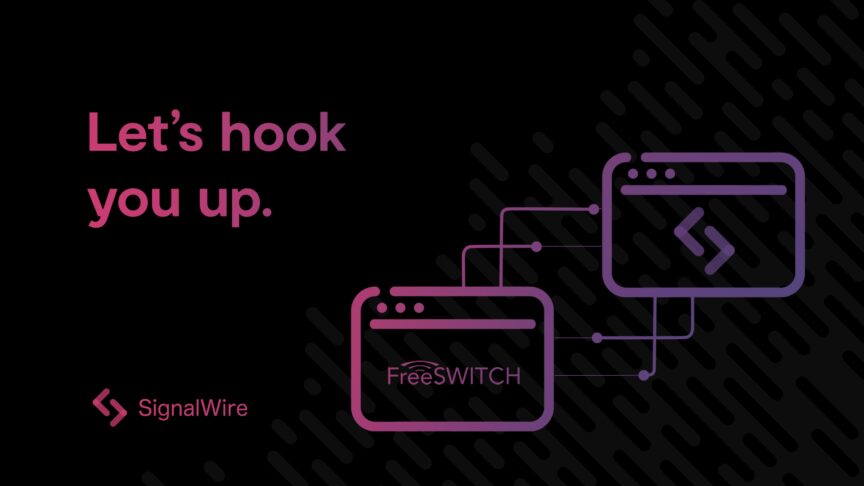Choosing between on-premises, cloud, and hybrid infrastructure comes down to a few practical tradeoffs: how fast you need to scale, how you handle security and compliance, what you can afford to own and operate long-term, and how much reliability and operational overhead you are willing to carry. This article compares on-prem systems like FreeSWITCH with cloud options like SignalWire across scalability, security, cost, reliability, and ease of use, then explains when a hybrid approach makes sense for teams that want to keep core telephony on-prem while offloading variable or CPU-intensive workloads to the cloud.
On-prem vs. cloud software
Deciding between on-premises and cloud hosting of software is an important infrastructure decision for any business. While on-prem software is installed directly onto in-house computers and servers, cloud software is stored on a provider’s server and accessed through a firewall-protected interface.
SignalWire stands on the shoulders of FreeSWITCH, so we understand the benefits of on-prem, cloud, and hybrid telecommunications infrastructure well. While many businesses are migrating to the cloud for their communications needs, you might be deciding if it's the right move for you. You might still need certain on-prem applications for a variety of reasons from security to regulations and compliance, but if you're looking to test the waters of cloud or hybrid solutions, you're in the right place.
Cloud computing offers numerous benefits to businesses of all sizes. It reduces costs significantly by eliminating the need for physical servers, storage devices, and other hardware. Cloud computing also provides a high level of scalability, allowing you to expand or reduce IT infrastructure as needed. This is especially beneficial for businesses with fluctuating workloads or seasonal spikes in demand.
There are several major factors to consider when choosing between on-prem and cloud software. These include software ownership, ownership costs, software upgrades, and additional services such as support and implementation. In this post, we'll delve into the pros and cons of on-prem systems like FreeSWITCH and implementations of the cloud through solutions like SignalWire.
Scalability
One of the main advantages of SignalWire's cloud is scalability. Businesses can easily scale their communication infrastructure up or down based on their changing needs without having to invest in additional hardware or software. Businesses can simply increase the capacity of their telecom methods in real time, enabling them to respond to customer needs and seasonal spikes quickly.
Security
Data security is absolutely crucial, no matter the industry. At SignalWire, communication data is secured through enterprise-grade, built-in security protocols like TLS encryption and SRTP. This ensures that communication data is always safe and secure from unauthorized access or eavesdropping.
Keeping your data close to home within your own on-prem infrastructure might give you peace of mind as well. You’re fully in control of your data - for better or for worse. If you’re in a highly regulated industry with many privacy and security concerns, this may be the only practicable option. However, an on-prem solution requires businesses to implement their own security protocols, which can be time-consuming and costly.
Cost
By eliminating the need for expensive hardware, software licenses, and maintenance costs, SignalWire's cloud is a cost-effective solution for businesses of all sizes. Businesses can save money by paying for only the communication services they need, and they can easily scale up or down to fit their budget. For businesses operating at an exceptionally large scale over a long period of time, an on-prem solution such as FreeSWITCH becomes more affordable.
Reliability
SignalWire's cloud is hosted on multiple redundant data centers and dispersed globally, ensuring high availability and reliability. Businesses can rest assured that their communication infrastructure is always up and running, even during unexpected downtime or maintenance windows. On-prem servers are far more vulnerable to experiencing downtime due to hardware or software failures.
Ease of use
Through a dashboard interface, REST APIs, or WebSockets, SignalWire is accessible and easy to use. Businesses can even manage their communication infrastructure with ease through low-code and no-code offerings. Anyone can provision new phone numbers, add new telecom features, and view usage analytics in just a few moments, saving time as well as money. In contrast, implementing FreeSWITCH requires Linux and telecom experts for development. In production, businesses rely on a dedicated IT team to manage the server, software, and hardware.
Hybrid solutions
In some cases, having control over FreeSWITCH server operations is non-negotiable for businesses. When servers have already been purchased, or telecom infrastructures have been previously developed with FreeSWITCH, it’s easy to connect to SignalWire for more CPU intensive or variable traffic.
For example, if you have your SIP agent registrations and dialplan already configured and running with FreeSWITCH, but you want to begin offering a video conferencing product, a far easier transition would be to use SignalWire’s Video APIs. A cloud solution can provide quicker time to value through Software Developer Kits, be cost-effective and reliable through initial usage, and save on-prem CPU usage in the long term by offloading large processes to SignalWire servers. Because this video SDK is built on top of FreeSWITCH, developers can leverage the capabilities of FreeSWITCH video while enjoying the ease of use and scalability of SignalWire.
While an on-prem server solution has its advantages with ownership at exceptionally high volumes and over long periods of time, SignalWire's cloud API offers scalability, security, cost-effectiveness, reliability, and ease of use. It’s a great option if you’re looking to move to the cloud for a modern telecommunication solution that can help your business grow.
If you have any questions while getting started with SignalWire, stop by our Community Discord to connect with our team! You can also reach out to sales@signalwire.com with questions about pricing, specific products, or check out FreeSWITCH Advantage.
Frequently asked questions
What is the difference between on-premises and cloud communications infrastructure?
On-premises software runs on servers you own and operate in your environment. Cloud infrastructure runs on a provider’s servers and is accessed over the internet through secured interfaces.
When does on-premises infrastructure make the most sense?
On-premises is often a better fit when you need maximum control over the environment, you operate in a heavily regulated context where keeping systems in-house is required, or your usage is consistently high enough that ownership is more economical over long periods of time.
When is cloud infrastructure the better choice?
Cloud infrastructure is typically best when you need to scale capacity up or down quickly, reduce hardware and maintenance burden, and prioritize time to value through dashboards and developer tools such as REST APIs and WebSockets.
What is a hybrid communications model, and when should you use one?
Hybrid means keeping some services on-premises while using cloud services for workloads that vary, spike seasonally, or require additional capabilities. A common pattern is running existing FreeSWITCH registrations and dialplan on-prem, then using cloud APIs for things like video conferencing to offload compute and speed up delivery.
Which factors matter most when comparing on-premises vs. cloud?
Most decisions come down to five areas: scalability, security, cost, reliability, and ease of use. This article walks through each, including the tradeoff that on-premises can be more affordable at very large, steady scale, while cloud can reduce operational complexity and scale quickly.


